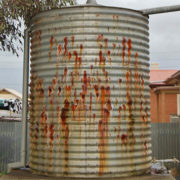This dry spell could make you sick
Public health warnings are being circulated as a dry spell across New South Wales and Queensland continues.
After a larger then usual gastro outbreak across the two states, those drinking unfiltered tank water are being urged to inspect their water storages for contaminates.
After a prolonged dry spell over autumn and winter, the levels of many rainwater tanks have fallen drastically due to a lack of rain.
Low rain and bore water levels can pose a danger with contaminates on the bottom of tanks presenting a concern for people relying on tank supplies for drinking water.
Harmful microorganisms, viruses and bacteria such as salmonella or campylobacter and gastro-intestinal parasites such as giardia or cryptosporidium can become prevalent in rainwater tanks due to contaminated gutters and roofs.
These harmful pathogens, are not visible to the naked eye and may even be present in relatively clear water.
Drinking water containing these microorganisms can cause severe gastro-enteritis, possibly lasting for several weeks.
Infants, the elderly and people with suppressed immune systems are most likely to be affected by gastrointestinal illness with symptoms including diarrhoea, stomach cramps and nausea.
With water carters filling many water deliveries, people drinking from water tanks without filters installed are urged to inspect or clean out their tanks or boil drinking water.
Research into tank water quality has found Australian tank water supplies are often heavily contaminated with bird and possum poo and some average rainwater storages have been found not to pass minimally acceptable standards for consumption.
A 2007 study found about 40% of rainwater tanks that were tested contained “heavy amounts” of animal faeces contamination that could lead to gastrointestinal disease.
Professor Ted Gardner, an expert in water-wise strategies at Queensland Institute of Technology where the research was presented, said more than two million Australians depended on roof-collected rainwater for their drinking water.
“People love rain water because it’s soft and apparently pure, but clearly it comes with more risks than many people realise,” Prof Gardner said.
The rise in cases at Emergency Departments amounts to a 34% rise in gastro compared to the same period last year.
Symptoms include nausea, vomiting, diarrhoea, fever, abdominal pain, headache and muscle aches and can take between one and three days to develop and usually last between one and two days, sometimes longer.
Coffs Coast Advocate 17th September 2017



